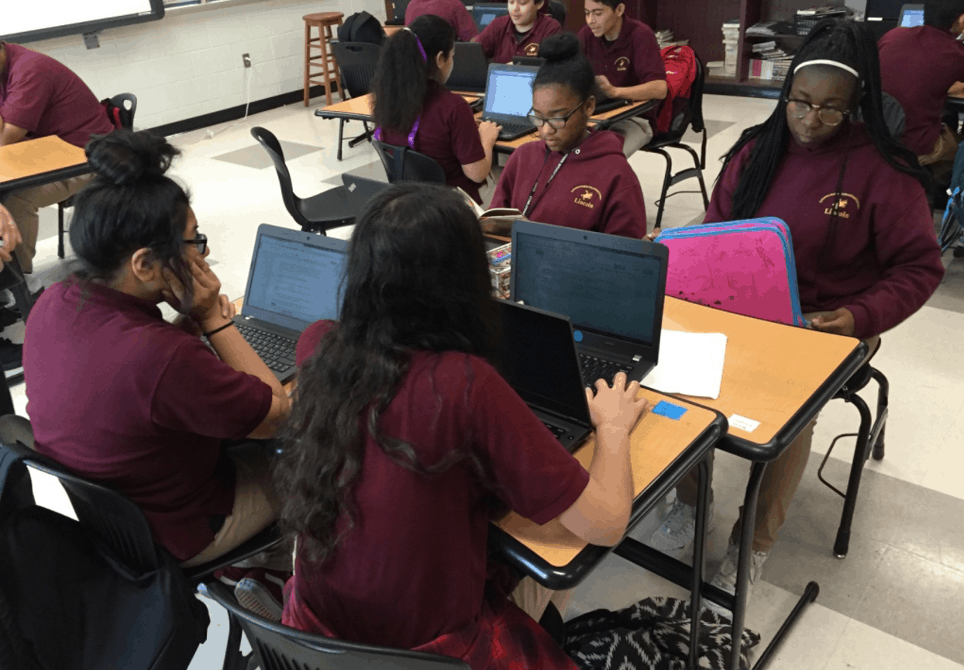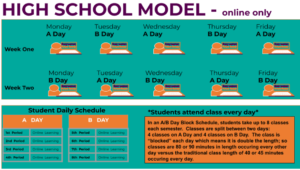Do You Have A Blended Learning Department? You Should.

Washington, D.C., is an interesting place for education. For years, the city was known for their underperforming schools, but in the last decade it has made a series of bold changes to address student access to quality education.
In a recent visit, we were lucky to see a dedication to early ed (D.C. is the only jurisdiction to extend its charter legislation to early learning and we saw pre-K classes in every elementary school–charter and traditional–that we visited) as well as commitment to blended learning in schools across the district.
After five years (2007-2012) of pushing improvement hard, the district began incorporating an innovation agenda. District of Columbia Public Schools (DCPS) has talented staff and has leveraged CityBridge Fellows (now three groups of alumni) and several rounds of Next Generation Learning Challenges (NGLC) grants.
After teaching English in Florida and Korea, John Rice accepted a challenging assignment at Anacostia High School in D.C. where he worked with over-age, under-credited students and created a blended learning model to allow students flexibility to work at their own pace with teacher support. After piloting this in his classroom, the model expanded to become the school’s online credit recovery program.
Rice founded the DCPS blended learning department in 2012, which started with math and has grown to include all subjects and all grades. His team supports planning, implementing and scaling blended learning models district wide.
With a group from Kansas City, we visited several DCPS schools sites to learn more about what the district has done as it relates to blended and personalized learning (for highlights from the trip, check out #KCGreatSchools on Twitter or Instagram).
Randle Highlands Elementary School
Randle Highlands Elementary School serves 363 students in the Southeast neighborhoods of D.C (Wards 7 and 8). 48% of students are within boundary, 64% are Free and Reduced Lunch and 15% are SPED. Principal Tracy Foster has been leading the Randle Highland team for five years. As a former FDA scientist, she followed a unique path to education (pushed beyond her own self doubt by a persistent sorority sister). She started her career in Oakland and has used her turnaround experience with Friendship Charter to rethink what learning looks like for Randle Highlands students.
Five years ago, the school had no tech and a difficult culture for educators, students and families. Foster developed a multi-year blended learning implementation plan, with support from a $250k anonymous grant. It is clear that the following are key elements to supporting the transformation of Randle Highland:
- Blended Learning Model: Foster explains that they have gotten to a place where the model “runs itself.” This station rotation, blended learning model is made up of two (math and ELA), 120 minutes blocks (science and social studies are integrated into those blocks) with three stations: a teacher station, a digital station and an independent and/or collaborative station. Teachers have creativity within how they structure the independent and small group stations, but the station model is one of a few non-negotiables for Foster. We saw several different online content in action: Lexia, I-Ready, MyOn, ST Math, Pearson Envision Math.
- Regular Progress Monitoring: Teachers are regularly (bi-weekly or weekly) looking at individual student data and developing intervention plans when needed.
- Talent Development: Foster has worked really hard to get the right teachers in the building. There is a diverse teacher group that represents the primarily African American student population. There is a male teacher at almost every grade level (more males than any elementary school that we have ever seen). What does she look for in her teachers? A focus on high expectations for students. Bottom line. They recruit mostly with recommendations from current teachers, but rarely have openings–even with a move to year round school, they will be only hiring for two spaces.
- Culture: The highest need when she first arrived was a culture shift for the staff as a team. Foster identified the interventions as too low, and put energy into using technology to personalize and increase the level of expectation for ALL students. The culture of high expectation is something that you can feel throughout every classroom. Students start their morning by reciting the Student Creed, classrooms are gender based beginning in 3rd grade, and there is a robust mentorship program for all struggling students, whether it’s academic or behavioral. All staff and faculty participate in the mentoring program.
Columbia Heights Educational Campus
Columbia Heights Educational Campus (CHEC) serves the Columbia Heights neighborhood–1410 students (34% African American, 61% Hispanic) and 40% ELL. Unique to CHEC is:
- A Rich History and Strong Leadership. The CHEC story began 36 years ago with the founding of the Multicultural Career Intern Program (MCIP) in 1979. A team of educators, led by CHEC’s founding and current principal Maria Tukeva (an inductee of the D.C. Education Hall of Fame and the longest serving principal in the modern era of D.C. public school system), were looking for an innovative, alternative school to provide a quality education experience for underserved students, especially those with limited English speaking. In the last 36 years, the MCIP and CHEC partnership has served 28,000 students and their families. They consistently graduated 90% of its senior class
- Personalized and Bilingual Learning Model: Students take both English Language Arts and a Spanish Language Arts course, and Science and History are taught 100% in Spanish. They have a 1:1 model (using Thinkpads) in the Middle School and will soon move that school-wide. Students have personalized learning time in the morning and the afternoon and expected about an hour a day at home (utilizing Basecamp and includes regular goal setting). The idea is that this opens up in class time to get a deeper level of Bloom’s Taxonomy.
- Summit Basecamp. This year, as CHEC is moving toward deeper personalized experience for students, their 8th grade team joined Summit Basecamp, a free program that provides educators with the tools, resources and support needed to bring personalized learning to their communities. As a result of their pilot, they will expand their work. Given that Summit is a charter management organization, they lean on district partners to define how personalized learning looks in different contexts. The D.C. Basecamp schools and John Rice’s district leadership have strongly informed how to implement personalized learning within a large urban district and “we are eager to share their advice, successes and lessons learned with similar schools in our second cohort,” notes Lizzie Choi, director of Summit Basecamp.
“Additionally, we know that implementing something new takes time and requires support from multiple perspectives. Even in year one, our D.C. teams have shown commitment to being leaders on personalized learning within their district and across our Basecamp cohort–from welcoming our engineers into their classroom for feedback sessions to working on cross-site and district problem-solving teams, we continue to be impressed and energized by their leadership and spirit of generosity. Several of our recent PLP features are a direct result of the D.C. team’s feedback. We are also refining our summer PD curriculum directly based off of D.C.’s collaboration with us on supporting ELL students. It has been a great example of partnership that we hope to continue.”
For more from our trip to Washington, D.C., check out:
- Getting Smart Podcast | Horace Mann Elementary: Where A Shared Pedagogy Vision Informs Design Principles
- D.C. Extends Performance Contracting from K-12 to Pre-K, Residential & Adult Ed
- Chavez Schools: Where Grads Leave Ready to Make a Difference
Stay in-the-know with all things EdTech and innovations in learning by signing up to receive the weekly Smart Update. This post includes mentions of a Getting Smart partner. For a full list of partners, affiliate organizations and all other disclosures please see our Partner page.





0 Comments
Leave a Comment
Your email address will not be published. All fields are required.